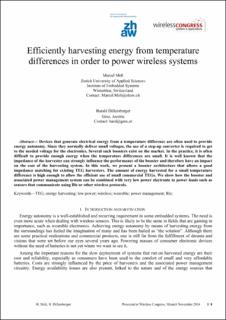Please use this identifier to cite or link to this item:
https://doi.org/10.21256/zhaw-7145| Publication type: | Conference paper |
| Type of review: | Peer review (abstract) |
| Title: | Efficiently harvesting energy from temperature differences in order to power wireless systems |
| Authors: | Meli, Marcel Dillersberger, Harald |
| DOI: | 10.21256/zhaw-7145 |
| Conference details: | Wireless Congress: Systems & Applications, Munich, Germany, 12-13 November 2014 |
| Issue Date: | Nov-2014 |
| Publisher / Ed. Institution: | ZHAW Zürcher Hochschule für Angewandte Wissenschaften |
| Language: | English |
| Subjects: | Low power; Booster; TEG; Energy harvesting |
| Subject (DDC): | 004: Computer science 333.79: Energy |
| Abstract: | Devices that generate electrical energy from a temperature difference are often used to provide energy autonomy. Since they normally deliver small voltages, the use of a step-up converter is required to get to the needed voltage for the electronics. Several such boosters exist on the market. In the practice, it is often difficult to provide enough energy when the temperature differences are small. It is well known that the impedance of the harvester can strongly influence the performance of the booster and therefore have an impact on the cost of the harvesting system. In this work, we present a booster architecture that allows a good impedance matching for existing TEG harvesters. The amount of energy harvested for a small temperature difference is high enough to allow the efficient use of small commercial TEGs. We show how the booster and associated power management system can be combined with very low power electronic to power loads such as sensors that communicate using Ble or other wireless protocols. |
| URI: | https://digitalcollection.zhaw.ch/handle/11475/7145 |
| Fulltext version: | Published version |
| License (according to publishing contract): | Licence according to publishing contract |
| Departement: | School of Engineering |
| Organisational Unit: | Institute of Embedded Systems (InES) |
| Appears in collections: | Publikationen School of Engineering |
Files in This Item:
| File | Description | Size | Format | |
|---|---|---|---|---|
| 2014_Meli-Dillersberger_Efficiently-harvesting-energy-from-temperature-differences.pdf | 602.53 kB | Adobe PDF |  View/Open |
Show full item record
Meli, M., & Dillersberger, H. (2014, November). Efficiently harvesting energy from temperature differences in order to power wireless systems. Wireless Congress: Systems & Applications, Munich, Germany, 12-13 November 2014. https://doi.org/10.21256/zhaw-7145
Meli, M. and Dillersberger, H. (2014) ‘Efficiently harvesting energy from temperature differences in order to power wireless systems’, in Wireless Congress: Systems & Applications, Munich, Germany, 12-13 November 2014. ZHAW Zürcher Hochschule für Angewandte Wissenschaften. Available at: https://doi.org/10.21256/zhaw-7145.
M. Meli and H. Dillersberger, “Efficiently harvesting energy from temperature differences in order to power wireless systems,” in Wireless Congress: Systems & Applications, Munich, Germany, 12-13 November 2014, Nov. 2014. doi: 10.21256/zhaw-7145.
MELI, Marcel und Harald DILLERSBERGER, 2014. Efficiently harvesting energy from temperature differences in order to power wireless systems. In: Wireless Congress: Systems & Applications, Munich, Germany, 12-13 November 2014. Conference paper. ZHAW Zürcher Hochschule für Angewandte Wissenschaften. November 2014
Meli, Marcel, and Harald Dillersberger. 2014. “Efficiently Harvesting Energy from Temperature Differences in Order to Power Wireless Systems.” Conference paper. In Wireless Congress: Systems & Applications, Munich, Germany, 12-13 November 2014. ZHAW Zürcher Hochschule für Angewandte Wissenschaften. https://doi.org/10.21256/zhaw-7145.
Meli, Marcel, and Harald Dillersberger. “Efficiently Harvesting Energy from Temperature Differences in Order to Power Wireless Systems.” Wireless Congress: Systems & Applications, Munich, Germany, 12-13 November 2014, ZHAW Zürcher Hochschule für Angewandte Wissenschaften, 2014, https://doi.org/10.21256/zhaw-7145.
Items in DSpace are protected by copyright, with all rights reserved, unless otherwise indicated.